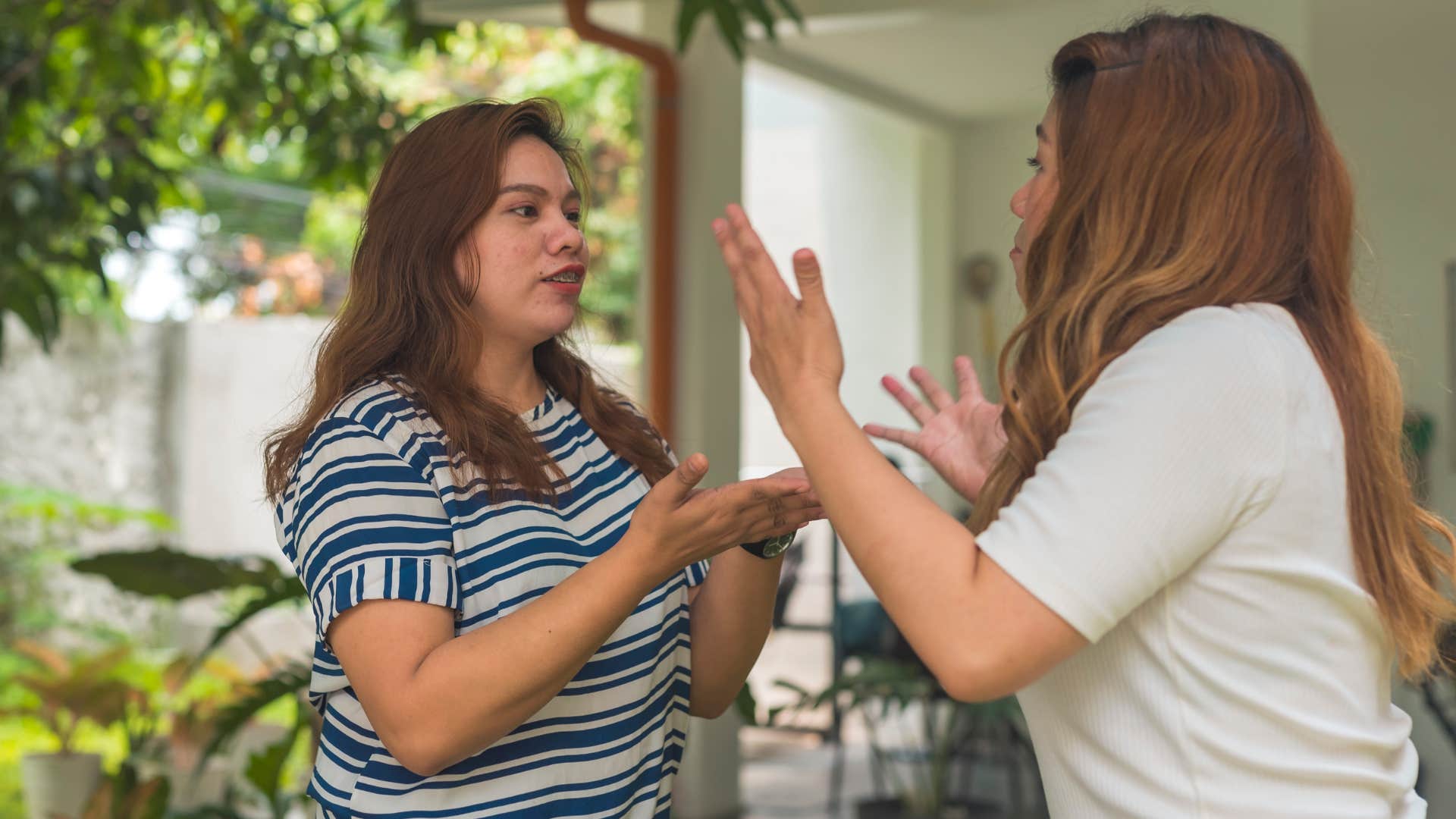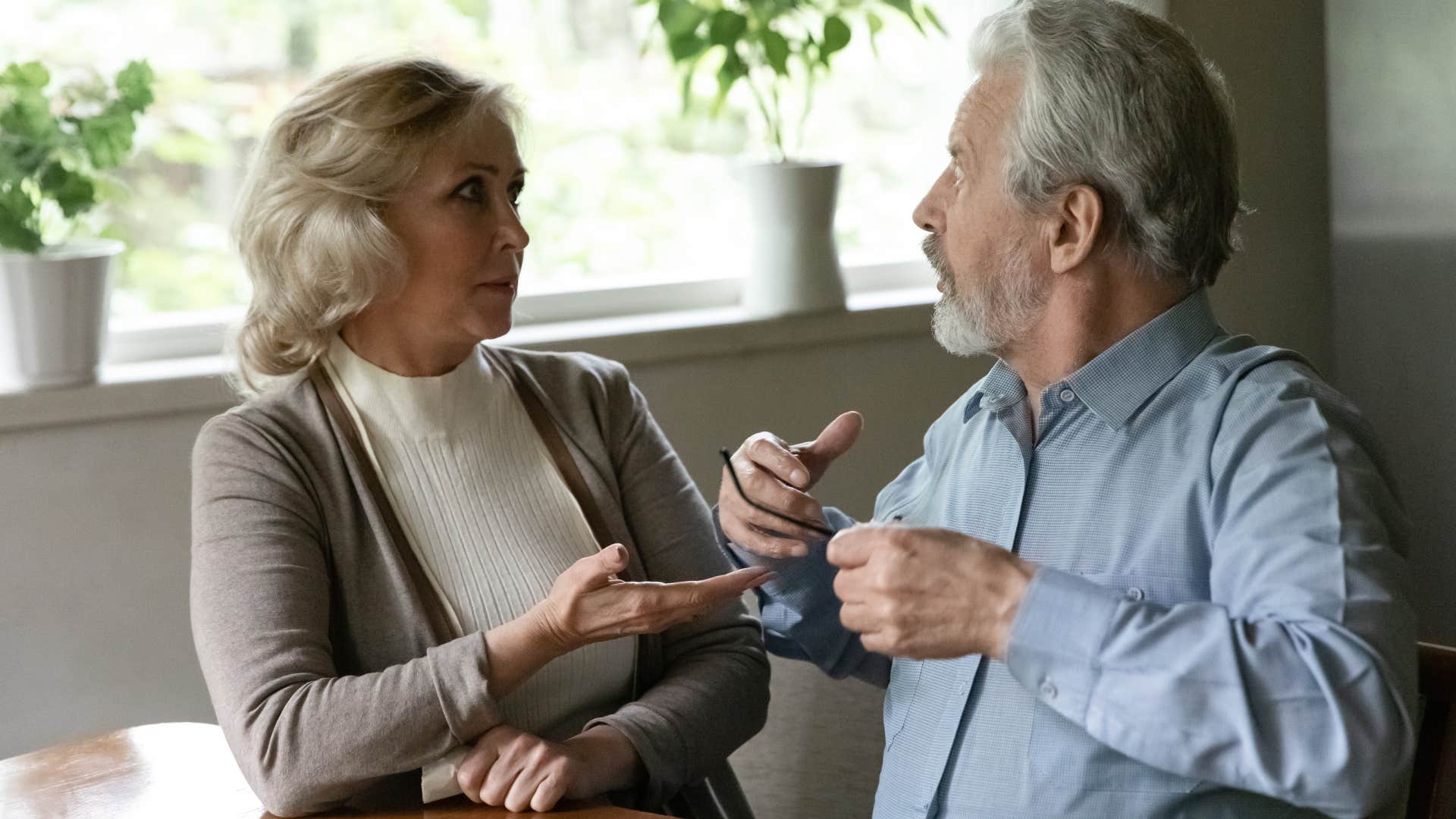11 Tiny Gestures That Speak Loudly When Someone's A Truly Bad Person
Keep an eye out for these red flags in your conversations.
 C Model | Shutterstock
C Model | Shutterstock While you might not think about it, our body language and nonverbal cues often say more about us in social interactions than our words do, at least according to Dr. Travis Bradberry, the author of "Emotional Intelligence 2.0." Not only does it have the power to enhance our connections and community, helping other people feel valued and heard in conversations, it can subtly sabotage conversations as well.
By recognizing and fixing our own unhealthy body language habits, we're more cognizant of the tiny gestures that speak loudly when someone's a truly bad person. Body language cues, even when they're subtle, can be "red flags" that someone doesn't respect you or care enough about you to make space for you in conversations. While they can be innocent in passing interactions, don't overlook these small signs, especially with someone you're already wary of.
Here are 11 tiny gestures that speak loudly when someone's a truly bad person
1. Interrupting others during a conversation
 Antonio Guillem | Shutterstock.com
Antonio Guillem | Shutterstock.com
According to personal coach Marty Nemko, consistent interruptions in a conversation can sabotage the health of a social interaction, making people feel unheard and undervalued.
Not only can interruptions cause people to think poorly of you — building resentment, even in passing conversations — it can sabotage the health of a future relationship founded on empathy and basic communication skills. It's as simple as this: when someone talks over you, they're less concerned with what you have to say than their own thoughts and opinions.
Of course, there's certain exceptions to this rule, like the tendency for people with ADHD to interrupt to cope with their hyperactivity. But, in general, someone who consistently interrupts is too worried about themselves to help others feel included and valid in conversations.
2. Turning away from someone while speaking
 Prostock-studio | Shutterstock.com
Prostock-studio | Shutterstock.com
When you're not turned towards someone while you're speaking or maintaining eye contact during a conversation, you may seem more disengaged when interacting with others, according to the American Management Association.
To make other people feel understood, heard, and valued — the fundamentals of a healthy conversation — it's important to balance both engaged verbal cues and body language. Even if it means turning your shoulders to face someone and uncrossing your arms, these subtle gestures can help other people to feel comfortable expressing themselves and speaking with you.
When someone has their back turned towards you or is constantly looking over your shoulder, those are some of the tiny gestures that speak loudly when someone's a truly bad person, actively making you feel less involved and valued in a conversation.
3. Avoiding eye contact
 Cast Of Thousands | Shutterstock.com
Cast Of Thousands | Shutterstock.com
According to a study published by the Personality and Social Psychology Bulletin, people who struggle to maintain eye contact in conversations are often perceived as less intelligent and competent than those who do.
While it's often uncomfortable to prioritize, and sometimes even distracting at first, for people who haven't practiced this tiny gesture, maintaining eye contact helps fuel positive perceptions of you and confidence in conversations. People who actively break eye contact or get distracted during conversations often encourage others to feel less heard in conversations, promoting an unhealthy dynamic where one person seems more engaged than the other.
Experts from Michigan State University argue that to fuel healthy connections, you don't even have to maintain eye contact for the entirety of a conversation. Even holding someone's gaze for 50% of a conversation will ensure you're not encouraging other people to feel dismissed or uncomfortable conversing with you.
4. Invading someone else's personal space
 Antoniodiaz | Shutterstock.com
Antoniodiaz | Shutterstock.com
Even in social interactions with people they're close with, everyone has their own unique personal boundaries that they encourage others to respect and be cognizant of. However, there's larger societal expectations, like respecting someone's personal space, that are generally applicable to all social situations and can spark resentment when they're not respected.
Being too close to someone while speaking or actively overstepping these personal boundaries can be tiny gestures that speak loudly when someone's a truly bad person.
While there's exceptions in every scenario, most people who consistently overstep these personal boundaries are less concerned with helping other people feel comfortable and valued, and more concerned with protecting their own image and helping themselves.
5. Checking their phone when someone's speaking
 Jacob Lund | Shutterstock.com
Jacob Lund | Shutterstock.com
Experts like Diane Ackerman, the author of "A Natural History of the Senses," argues that our eyes are incredibly important and impactful in conversations. Considering over 70% of our body's receptors are located in our eyes, they hold a great deal of power in helping us to connect and socialize with others.
When we're distracted with something going on around us or diverting our attention towards our phones when someone else is speaking, we're actively encouraging others to feel dismissed and invalidated. Not only does this disengagement sabotage conversations and healthy connections, it urges people to associate their uncomfortable feelings of insecurity with our character.
Not looking at another person when they're speaking is one of the tiny gestures that speak loudly when someone's a truly bad person, especially when coupled with other rude gestures and behavioral tendencies that make us feel less heard and valued.
6. Rolling their eyes
 Nicoleta Ionescu | Shutterstock.com
Nicoleta Ionescu | Shutterstock.com
Rolling your eyes during a conversation not only conveys a general sense of disinterest and disengagement to others, it also encourages them to feel invalidated while expressing their emotions and opinions.
Of course, it's not possible to avoid confrontation or frustration in conversations, even with people we don't know well, but there are healthy ways to express and mediate it that don't encourage other people to feel uncomfortable or unvalued.
People with a good character and commitment to empathy lead with compassion in their conflicts, expressing their emotions and being a beacon of support for others to do the same. On the other hand, people who roll their eyes or interrupt others may be more concerned with asserting their misguided superiority or putting other people down to make themselves feel better.
7. Consistently forgetting someone's name
 MAYA LAB | Shutterstock.com
MAYA LAB | Shutterstock.com
Considering people are yearning to feel heard in conversations, like experts from The Social Skills Center argue, misleading tiny gestures that speak loudly when someone's a truly bad person can actively sabotage the health of conversations and social interactions.
Remembering someone's name in a conversation is a simple way to help them feel valued, even if it seems subtle. People who don't commit themselves to learning people's names or encouraging them to feel comfortable often set themselves up to be perceived as a disengaged and untrustworthy person.
Make the effort, even if it seems basic or unproductive, to learn names. It helps social interactions more than you realize.
8. Using dismissive hand gestures
 MDV Edwards | Shutterstock.com
MDV Edwards | Shutterstock.com
Body language like a smirk or subtle hand gestures have a lot of power over conversations, especially in encouraging other people to feel dismissed or invalidated. Not only do these uncomfortable feelings spark resentment in pre-existing relationships, they can sabotage potential in conversations — forming sometimes misleading and negative perceptions of your character.
When you're speaking to someone and they're constantly brushing off your emotions — both figuratively and literally with passive hand gestures — you're probably not going to want to get vulnerable with them again. It might not mean they're inherently a bad person, but when you're working through conflict or encouraging someone who hurt you to take accountability, these tiny gestures can speak loudly about their character.
9. Leaning back during a conversation
 Antonio Guillem | Shutterstock.com
Antonio Guillem | Shutterstock.com
Nonverbal cues like leaning back during a conversation tend to convey a sense of disinterest and disengagement, even if they're not intentionally malicious. Especially in intense or emotional conversations, when we're expressing our emotions or mediating a conflict, conveying this disinterested body language — turned away or leaning away from a partner — can be disillusioning for everyone involved.
When your language doesn't sync up with your nonverbal body cues, you're not just helping people to feel less heard and supported while they're sharing opinions and emotions, you're encouraging them to take a more disinterested approach to active listening when it's your turn to speak.
10. Not mirroring facial expressions with verbal cues
 simona pilolla 2 | Shutterstock.com
simona pilolla 2 | Shutterstock.com
The art of active listening is wrapped up in both verbal and nonverbal cues. We help other people feel valued in conversations by showing that we're listening to what they're saying — whether that's with intentional and thoughtful questions, open body language, or facial expressions that convey interest, rather than disengagement.
Experts from Rasmussen University argue that these nonverbal facial expressions can help convey interest in a variety of situations, whether you're watching someone present in a professional meeting or talking on a first date.
Use a small smile, bright eyes, or even a simple nod when talking to someone to remind them that you're not just listening, but genuinely interested in what they have to say. You not only encourage healthy social connections that add value to your life, but start building trust and comfort with people that may grow into more fulfilling and long-term relationships.
11. Fidgeting
 Fizkes | Shutterstock.com
Fizkes | Shutterstock.com
While there's a sleuth of reasons why someone might be more prone to fidgeting excessively during a conversation, from attention disorders, to overwhelming stress and distractions, people who are uninterested with what you have to say might tap their leg or fidget with their hair as a means to soothe their own boredom.
Typically, this subtle body language isn't intended to be malicious and, in many cases, it's entirely subconscious. But for people you already don't trust or connect with, it can be discouraging and unhealthy for productive conversations.
Zayda Slabbekoorn is a staff writer with a bachelor's degree in social relations & policy and gender studies who focuses on psychology, relationships, self-help, and human interest stories.

